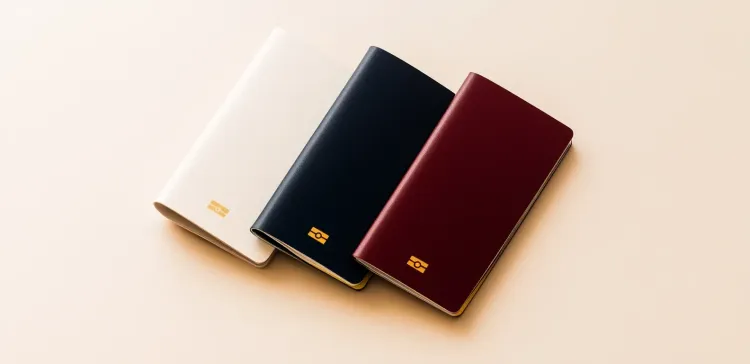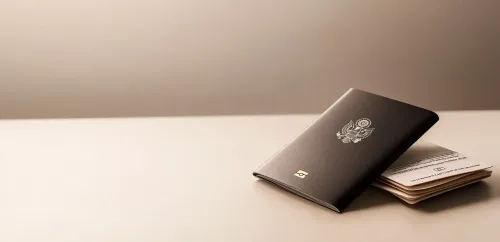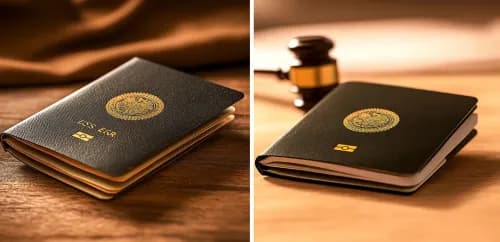Types of Passports in India

Destination (from India)
Dates of Travel (optional)
List of Content
- •Types of Passports in India
- •1. Ordinary Passport (Blue Passport)
- •2. Official Passport (White Passport)
- •3. Diplomatic Passport (Maroon Passport)
- •4. Emergency Certificate
- •5. Tatkaal Passport Service
- •6. Application Process for a New Indian Passport
- •7. Documents Required for a New Passport
- •Conclusion: Which Passport Do You Need?
Types of Passports in India
Traveling abroad is exciting, whether for work, leisure, or education. But before you start packing your bags, there’s one essential document you need: a passport. In India, not all passports are the same.
Depending on your purpose of travel and your role, the type of passport you hold may vary. Let’s break down the different types of passports issued in India, who they are for, and what makes them unique.
What is a Passport?
A passport is an official travel document issued by a country's government that certifies the identity and nationality of its holder for international travel. It allows the passport holder to travel from one country to another and serves as proof of their citizenship. Most people think of passports as just one document, but there are actually several types in India, each serving a distinct purpose.
1. Ordinary Passport (Blue Passport)
The most common type of passport issued in India is the Ordinary Passport, also called the Blue Passport because of its cover color. This is the passport that most Indian citizens apply for when they need to travel for personal reasons, be it for a holiday, study, work, or even immigration.
Who Can Apply for the Ordinary Passport?
Any Indian citizen can apply for this passport. Whether you’re planning a family vacation, attending a business meeting abroad, or pursuing higher education in another country, this is the passport you need. It is the standard document for international travel.
Key Features of the Ordinary Passport:
- Cover Color: Blue.
- Validity: Typically, the passport is valid for 10 years, but for minors (under 18), it’s valid for 5 years or until they turn 18, whichever comes first.
- Purpose: Travel for tourism, study, work, or business.
- Issued to: Any Indian citizen, without any special criteria or government affiliations.
Where You’ll Use It:
Once you get a visa for the country you’re visiting, you’ll need your blue passport as identification at airports, for immigration checks, and as an official travel document to enter foreign countries.
2. Official Passport (White Passport)
The Official Passport, commonly known as the White Passport, is reserved for government employees or individuals traveling for official purposes. This passport is not meant for personal travel like vacations or family visits; instead, it is specifically issued for government work abroad.
Who Can Apply for the Official Passport?
This passport is given to individuals representing the Indian government, such as government employees, public servants, or members of official delegations traveling abroad for work. It cannot be used for personal trips.
Key Features of the Official Passport:
- Cover Color: White.
- Validity: The validity depends on the nature of the government assignment or mission.
- Purpose: For official government work abroad.
- Issued to: Government employees, public servants, or others on official government assignments.
Privileges of the White Passport:
Those holding an official passport enjoy certain privileges, like exemptions from taxes or duties in the host country, and sometimes fast-tracked visa processing, depending on international agreements.
Where You’ll Use It:
White passports are specifically meant for official travel, such as attending international conferences, government meetings, or negotiations. If the holder wants to take a personal trip later, they will need a regular blue passport for that.
3. Diplomatic Passport (Maroon Passport)
Overview
The Diplomatic Passport, known for its maroon cover, is reserved for the most senior officials of the Indian government, including diplomats and ambassadors. Diplomatic passport holders enjoy numerous benefits when traveling abroad, such as diplomatic immunity, which offers certain legal protections under international law.
Who Can Apply for the Diplomatic Passport?
Diplomats, ambassadors, and high-ranking government officials representing India on an international stage can receive a diplomatic passport. It is typically issued to those in Indian foreign missions, consulates, or embassies.
Key Features of the Diplomatic Passport:
- Cover Color: Maroon.
- Validity: The passport’s validity corresponds with the diplomat’s tenure or assignment abroad.
- Purpose: To represent India in foreign countries with diplomatic status and benefits.
- Issued to: Diplomats, ambassadors, and high-ranking officials traveling for diplomatic missions.
Privileges of the Diplomatic Passport:
Diplomatic passport holders are given special treatment, which can include diplomatic immunity (protection from prosecution under local laws), easier visa processing, and the ability to bypass certain customs checks. Diplomatic passports are recognized worldwide, signaling the passport holder's role in representing their country.
Where You’ll Use It:
Diplomatic passports are used primarily by diplomats traveling for foreign missions or international negotiations. If a diplomat wants to travel for personal reasons, they may also hold an ordinary passport for those purposes.
4. Emergency Certificate
An Emergency Certificate is not a traditional passport but a temporary document issued in certain cases where an Indian citizen is stranded abroad without a valid passport. This document allows the individual to return to India.
Who Can Apply for the Emergency Certificate?
Any Indian citizen who loses their passport, has it stolen, or finds themselves in a situation where they can’t travel back home without documentation can apply for an Emergency Certificate through the nearest Indian embassy or consulate abroad.
Key Features of the Emergency Certificate:
- Cover Color: No cover, as it is a temporary document.
- Validity: Typically valid only for a single journey back to India.
- Purpose: To facilitate the return of Indian citizens who are stranded abroad without a passport.
- Issued to: Indian citizens who need immediate repatriation but do not have a valid passport.
Where You’ll Use It:
The Emergency Certificate can only be used to return to India and is not valid for international travel to other countries. Once back in India, the individual will need to apply for a new passport.
5. Tatkaal Passport Service
While not a separate type of passport, the Tatkaal Passport Service is an expedited service for those who need their passports urgently. Whether due to sudden travel plans, business emergencies, or other pressing matters, the Tatkaal service ensures quicker passport issuance.
Who Can Apply for the Tatkaal Passport?
Anyone who needs a passport quickly can apply under the Tatkaal scheme, provided they meet all the necessary documentation requirements. The process is more expensive but ensures faster processing.
Key Features of the Tatkaal Passport Service:
- Processing Time: Much quicker than the standard procedure, usually within 1-3 days.
- Higher Fees: Tatkaal services come at a higher cost to expedite the process.
- Purpose: For urgent passport requirements.
- Issued to: Anyone who needs their passport in a hurry.
Where You’ll Use It:
The Tatkaal Passport Service is useful when you have an unplanned trip or a situation that requires quick passport issuance. While the passport issued under this service is still an ordinary passport, it’s simply processed faster.
6. Application Process for a New Indian Passport
Applying for a new passport in India has become much more streamlined thanks to the integration of online services and the network of Passport Seva Kendras (PSKs) across the country. Here’s a step-by-step breakdown of how you can apply for a new passport:
a. Register Online:
Start by visiting the official Passport Seva website (www.passportindia.gov.in). You’ll need to create a personal account using a valid email ID. Once registered, log in to your account to access the passport application form.
b. Fill Out the Application Form:
Choose the type of application (fresh passport or reissue). Carefully fill out the form with details like your full name, date of birth, residential address, and employment status. Make sure all information is accurate and up to date, as errors could delay processing.
c. Select the Appointment Location and Date:
Once your form is submitted online, you’ll be prompted to choose a nearby Passport Seva Kendra (PSK) or Post Office Passport Seva Kendra (POPSK) for your in-person document verification and biometric capture. Select a time slot that suits you from the available dates.
d. Pay the Application Fee:
Pay the required fee online using your preferred payment method, including debit or credit cards, internet banking, or through an SBI bank challan. For minors and Tatkaal (urgent) applications, the fees differ. Here’s a detailed look at the fee structure:
- For Fresh Passport for Minors (under 15 years):
The application fee is INR 1,000 for a regular 36-page passport.
- For Fresh Passport for Minors (aged 15-18 years):
The fee for a standard 36-page passport is INR 1,500, while a 60-page passport costs INR 2,000.
- For Adults (aged 18 and above):
The standard fee for a 36-page passport is INR 1,500, and for a 60-page passport, it’s INR 2,000.
- Tatkaal Passport Service (for urgent applications):
For urgent processing under the Tatkaal scheme, the fee is INR 3,500 for a 36-page passport and INR 4,000 for a 60-page passport. Tatkaal applications are typically processed within 1-3 working days, ensuring quicker passport issuance.
Payment Methods:
You can pay the passport application fee through multiple secure channels, including:
- Debit or credit cards (Visa, MasterCard)
- Approved internet banking (supported by most major Indian banks)
- SBI bank challan (visit the nearest State Bank of India branch to make payment)
- SBI wallet payment for faster processing
Make sure to keep a copy of your payment receipt for future reference, as it will contain your application reference number.
e. Attend Your Appointment at the PSK/POPSK:
On the day of your appointment, visit the selected Passport Seva Kendra with your original documents and photocopies. At the center, your biometric details (fingerprints and photographs) will be captured, and you may be asked to verify your application details.
f. Police Verification:
Once the verification process at the PSK is complete, the passport office sends a request to your local police station for background verification. The police may visit your registered address or call you to the station to verify your identity and address. This step is mandatory for first-time applicants.
g. Track Your Application Status:
You can track the status of your application online using your reference number. Updates will also be sent to you via SMS or email. In most cases, the passport is processed within 10-15 working days for regular applications, or sooner if you’ve opted for the Tatkaal service.
h. Receive Your Passport:
Once your application is verified and approved, your passport will be printed and dispatched to your home address via India Post. For most regular applications, this takes about 15 days. Tatkaal services offer expedited processing for urgent cases.
7. Documents Required for a New Passport
When applying for a new passport in India, it’s crucial to have all your documents in order to avoid delays. These documents help establish your identity, address, and nationality. Here’s a list of the key documents you’ll need to submit along with your application:
1. Proof of Identity (Any One):
- Aadhar Card
- Voter ID Card
- PAN Card
- Driving License
- Government-issued ID card (for government employees)
2. Proof of Address (Any One):
- Aadhar Card
- Recent Utility Bill (electricity, water, or telephone; no older than 3 months)
- Rental Agreement or Bank Passbook
- Voter ID Card
- Proof of Gas Connection
3. Proof of Date of Birth (Any One):
- Birth Certificate
- School Leaving Certificate/Matriculation Certificate
- PAN Card (if birthdate is clearly mentioned)
- Aadhar Card
- Transfer Certificate (TC) from school
- 4. Additional Documents for Minors (If Applicable):
- Birth Certificate of the minor
- Parents' Passport (if available)
- Annexure H: A declaration by parents or legal guardians regarding the minor's passport application
5. Supporting Documents for Special Cases (If Applicable):
- Annexure E: For married applicants changing their name after marriage
- Annexure F: For government employees requiring official clearance for the passport application
- Police Clearance Certificate (PCC): Required for certain categories of applicants, especially for those seeking visas for work or residence abroad
6. After successful payment, you’ll receive a confirmation receipt and a reference number.
Conclusion: Which Passport Do You Need?
Now that you know the different types of passports in India, choosing the right one for your specific needs becomes much easier. For most of us, the Ordinary Passport will be all we need for our international adventures. Whether it’s a business trip, a vacation, or studying abroad, the blue passport will get you where you need to go.
If you’re traveling on official government business, the Official Passport (white cover) is the one you’ll need. And for those representing India at the highest level, the Diplomatic Passport (maroon cover) grants special privileges.
For emergencies abroad, there’s the Emergency Certificate, which is a lifeline for those who lose their passports and need to return home. Lastly, the Tatkaal Passport Service ensures that you can get your passport quickly in case of urgent travel plans.
Knowing the differences between these passports and services helps you make informed decisions and ensures your travel plans go smoothly.
Other topics

